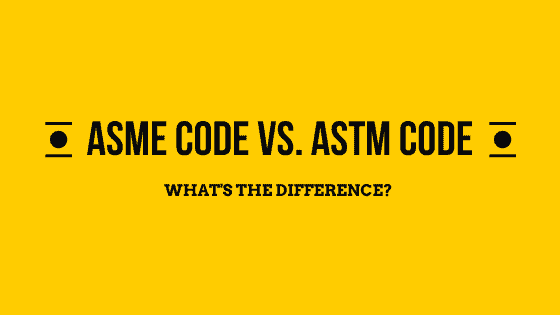There are many codes and standards relevant to industrial heating equipment, including ANSI, ASME, API, and ASTM just to name a few.
As a result, when shopping their options, many of our customers and clients need to do a bit of research to fully understand what each code or standard indicates about the equipment, and which codes and standards are specifically relevant to their industry or application.
Here, we’ll dive into a quick comparison of ASME code and ASTM code, reviewing their similarities and differences.
Understanding ASME Code for ASME Industrial Heaters
ASME – which stands for American Society of Mechanical Engineers – is one of the leading international standard and code developers for the mechanical engineering industry. They are a non-profit organization that works to encourage collaboration across engineering disciplines and to promote art and science.
Also referred to as ASME Boiler & Pressure Vessel Code or BPVC, ASME code regulates the design, development, and construction of boilers and pressure vessels used in various industries. The guidelines dictated by ASME provide safety criteria intended to help prevent accidents and make mechanical equipment safer.
Equipment that is ASME code stamped has been carefully and thoroughly inspected and meets the rigid quality and safety standards established by ASME’s Boiler & Pressure Vessel Code.
Essentially, equipment that adheres to ASME code meets high level quality and safety standards. As a result, the ASME code stamp is an important one to look for if you’re purchasing a boiler or pressure vessel for your facility. Find out more about ASME code here.
Understanding ASTM Code for ASTM Industrial Heaters
ASTM refers to ASTM International, but used to stand for American Society for Testing and Materials.
This organization publishes technical standards related to the quality of the materials that can be used in the manufacture of various products and pieces of equipment, including those built to ASME code. The standards are developed by committees and are often adopted into other codes and made mandatory by other regulations.
It is perhaps relevant to note that ASTM does not play a role in enforcing the requirements they establish for the various materials, products, systems and services to which their codes apply.
It’s a good idea to ensure that the equipment you are purchasing meets ASTM code standards and is built with high quality, approved materials.
Comparing ASME and ASTM Codes
As you likely understand from the quick overview of the two codes above, ASME and ASTM standards are related yet separate. The two entities have often cooperated to create material specifications that apply to the industrial heating industry.
Equipment built to ASME code is often built using the materials designated by ASTM code (though it’s also important to note that there are also many ASTM materials that are not appropriate for use in ASME code stamped equipment manufacturing).
These are just two of the various codes that apply to industrial heaters and heating systems. As you’re shopping your equipment options, they are two important standards to keep in mind.
Interested in learning more about the standards and codes used to label and assess industrial heaters and heating systems?
We’ve put together a handful of resources overviewing and comparing the various different measures used to assess and label industrial heating equipment, including:
- What is ASME Code and Why Does It Matter?
- ANSI vs. ASME: What’s The Difference?
- What’s the Difference Between ASME and API Code?
- API Specifications: What They Are and Why They Are Important
- AISC Membership: What It Is and Why It Matters
Have additional questions about which codes and standards you should care most about given your industry and applications?
Give us a call today at (715) 748-5888 or contact us online and we’d be happy to point you in the right direction.
We’re able to build equipment to meet customized specifications, and the equipment we design and produce can be crafted to adhere to various industry standards and codes.

